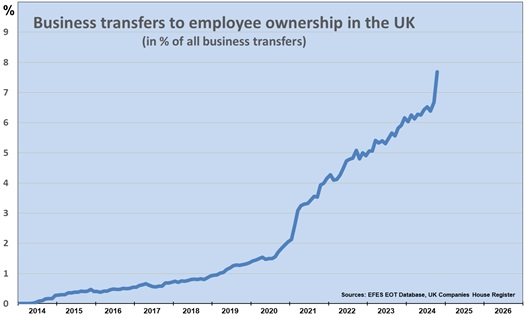|
EFES NEWSLETTER - NOVEMBER 2024
|
It
is like a new iPhone, Steve Jobs style. But this time
it's not an iPhone. It is employee ownership, and it
is happening in Great Britain.
In terms of scale and speed of expansion, the rise of
employee ownership in SMEs surpasses anything that has
gone before. A real revolution is unfolding before
our very eyes.
It won't be long before one in ten business transfers
will go to employees (see graph). Another ten years
and we'll be approaching the threshold of one employee-owned
SME in ten. This applies to all UK SMEs, of which there
are 210,000 today. At this rate, there will be 20,000
employee-owned businesses by 2035–2040.
As we can see, this is a major transformation in the
corporate landscape and the roots and growth of companies.
|

|
The reason for this success is well known:
A new dynamic has emerged worldwide over the last ten
years or so, that of employee ownership in SMEs.
It takes precedence over other types of “financial participation”
(profit-sharing, individual employee shareholding).
It doesn't take the place of these other types, but
is a new type that was previously virtually unknown.
This involves the transfer of businesses, mainly SMEs.
We know that companies are passed on to a new generation
of managers and owners every 20 years or so. The spectacular
development in Great Britain is based on the Employee
Ownership Trust arrangement. This makes it possible
to organise the transfer of companies without employees
having to make any financial investment.
Unlike traditional individual employee shareholding,
the aim here is not to share "a small piece of
the pie”. The idea is to “transfer control” of the company
to a collective employee share ownership mechanism.
That is another thing entirely.
And it works better than any other form of employee
share ownership, especially in SMEs.
|
Press
review
A
selection of 41 remarkable articles in 7 countries in October
2024: France, Netherlands, Norway, Slovenia, Sweden, UK, USA.
France: New employee share plans for Stellantis, for
Renault, for LVMH. New workers' coop for rescuing Bergère
de France.
Netherlands: Goudappel is a typical example of the
use of employee share ownership trusts in the Netherlands.
Norway: Jackpot for Kongsberg employee shareholders.
Slovenia: The bill for employee ownership is more or
less written. Employee ownership at Metrel is an example of
the difficulties to be overcome.
Sweden: Most architectural firms are organized as partnerships
in which employees are the majority shareholders.
UK: Thanks to the Employee Ownership Trust formula,
one or two new SMEs are transferred to their employees every
day. This month, among others, the case of: Magenta Facilities
Management, Lunya Restaurant, Abbeydale Brewery, Roch Valley
Dancewear, Alara Wholefoods, Meldrum Construction, Gwasg Pia
Media, Joss Search Recruitment, John Hunt Demolition, Criteria
Fieldwork Agency, Home Legal Direct, Orchard Media, Rock Kitchen
Harris Creative Agency, Camlins Architects, William Search
Events, Armeg Tools, Stephensons Buses, Progression Solicitors,
Challenge-trg Recruitment, Optimum Underfloor Heating, Cambridge
IT Support.
The flexibility of Employee Ownership Trusts can also be used
for hybrid ownership structures, combining EOT with direct
shareholding, balancing employee incentives with stable trust
control.
USA: Some good examples of ESOPs in the US: Spectrums,
AEC Electric Works, COCM.
The full press review is available
on:
https://www.efesonline.org/PRESS
REVIEW/2024/October.htm
|
 A
political roadmap for employee ownership in Europe
A
political roadmap for employee ownership in Europe
 The
EFES needs more members. Download the EFES membership form
The
EFES needs more members. Download the EFES membership form
 What's
new on the EFES website?
What's
new on the EFES website?
 EFES NEWS
distribution: 200.000
EFES NEWS
distribution: 200.000
|